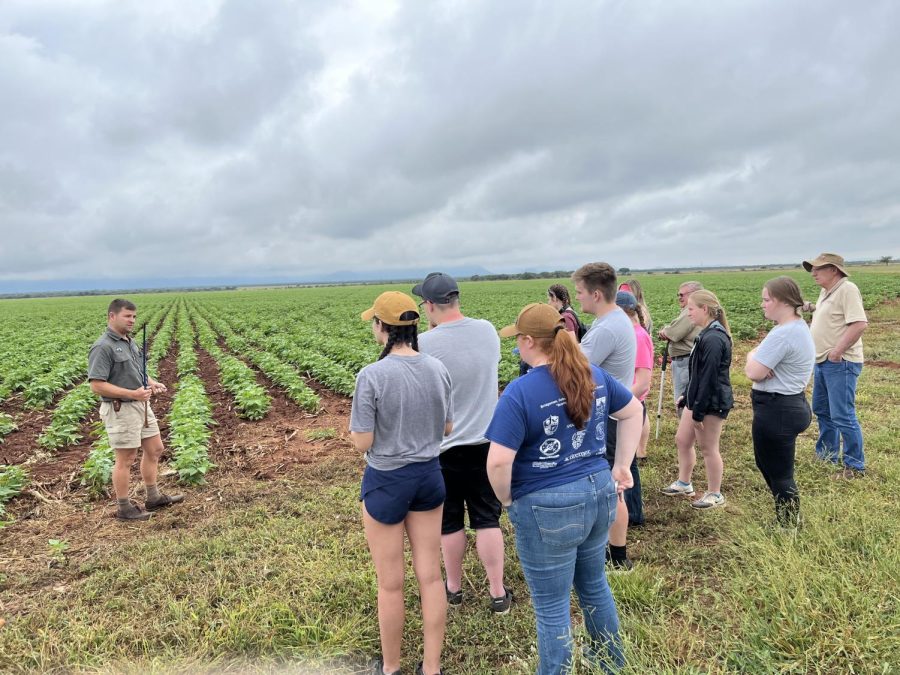South Africa offers agriculture, wildlife, culture
South Dakota State University agriculture students get a lesson on South African agricultural practices during a spring break trip to the African nation.
April 26, 2022
Study abroad trip features this lesson: ‘Life is lived so differently, yet so similarly, too’
A group of South Dakota State University agriculture students had a once-in-a-lifetime experience during spring break.
Rather than spending their time away from class on a beach, these students went on a faculty-led trip to South Africa to further their agricultural knowledge.
Samantha Thyen, an animal science major at SDSU, talked to the Collegian and discussed many aspects of the trip, such as the reason behind it, how it came to be and what she took away from it. Here’s what she said.
QUESTION: What was the reason behind taking the trip to South Africa?
ANSWER: South Africa/Africa in general is a place I have always wanted to visit, and this international experience opportunity seemed like the safest and best way to travel there. I also wanted to be able to compare agricultural practices in South Africa to the United States.
Q: Had you ever been out of the country before this?
A: No, I have not traveled out of the U.S. before.
Q: What was your favorite part of the trip?
A: There were so many great aspects of this trip that I will forever treasure. We were able to see a large variety of agriculture, wildlife and culture. However, my favorite part of the trip was Trekpad Safaris. Here, we had a great combination of agriculture (both cattle and crops) and wild game sectors to interact with and see, which are both important to South Africa. On their wild game farm, we helped move two nyala bulls.
Q: Did COVID affect any part of the trip?
A: COVID did have some impact on our trip. We all had to have proof of vaccination and a negative COVID test result before leaving and returning to America. Additionally, masks had to be worn in public areas. Some places that would have normally been on the itinerary, like the Apartheid Museum, were closed due to COVID, but most stops were open for tourists.
Q: What were some of the activities you did?
A: Farm visits were a main activity of the trip to South Africa. In addition to submerging ourselves in their agriculture, we had the opportunity to visit national monuments and museums significant to their history. We were also able to take a safari ride at Pilanesberg National Park and at a cheetah preserve.
Q: How long had this trip been planned out or been a bucket list item for this group?
A: Two other groups of SDSU students have gone to South Africa in the past, so I knew this may be an opportunity I would possibly want to take advantage of. We were the first group of SDSU students to study abroad since COVID-19 began. Although I know there were people working in the background for the past three years to allow this trip to happen, Dr. Gonda [Michael Gonda, professor of animal science] did not start reaching out to students to plan travel until last fall around October-November. Even at this point we were unsure if this trip was going to happen or not.
Q: Why was South Africa the location chosen?
A: The location of South Africa was predominately chosen because of connections we had there. It was formed by Michael MacNeil. He received his PhD at SDSU and is a beef geneticist. He served as an adviser to the South African Agricultural Research Council and reached out to Gonda to make this trip possible. I also think this location is special to have available as a study abroad trip because there is such a widespread of agriculture that is eye-opening to see.
Q: What were some of your fears about this trip before leaving and did any of them come true?
A: We had fears about COVID not allowing us to be able to take the trip at all. One of the biggest concerns from multiple people in our group was the safety of South Africa. However, those that formed this trip truly did an amazing job by picking areas that were secure and safe. I never once felt unsafe on this trip.
Q: What was the biggest thing you took away from this trip?
A: Something I took away from this trip was being able to see how life is lived so differently, yet so similarly too. Comparing agricultural practices was such a huge part of this trip, and I realized that we need to be accepting to production differences and to be open to implementing new ideas too. I became more thankful for what I have, and this trip was truly a humbling experience.





















